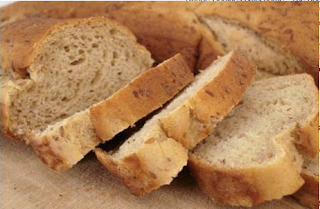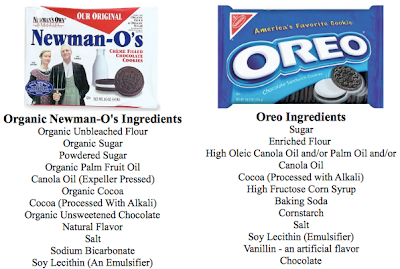As a wise Ed Bauman once said, "Boulder is completely gluten free-ked out." He's right. Almost every restaurant has a gluten free menu in this town, and the trend is spreading through the country.
But despite the growing acceptance of a gluten free lifestyle, almost everyone who has stopped eating gluten has been chided or interrogated for their choice to pass on the bun and just eat the burger. Or for the burrito-less burrito they order at Chipotle - the one without the delicious tortilla. It's embarrassing sometimes to be gluten-free because people think you're just crazy - that you're making it all up. "Why would you suddenly not be able to tolerate something you've eaten your whole life? It's all in your head."
This post is dedicated to all of you who've been ridiculed for your choice, which sometimes isn't really a choice, to pass on wheat, barley, rye, kamut, conventional oats and spelt. Listen up, all you wheat eaters - this is why your brother/girlfriend/co-worker is so gluten freaked out.
 |
| http://ltnixonrants.blogspot.com/2008_09_01_archive.html |
It's because this person probably was suffering from any of these symptoms before they took it out of their diet:
Fatigue
Bloating
Depression and Anxiety
Diarrhea
Migraines or other headaches
Weight Gain
Water Retention
Heartburn
Joint Pain
Blood Sugar Imbalances
Eczema
Psoriasis
Thyroid problems
Multiple Sclerosis
Rheumatoid Arthritis
Irritable Bowel Syndrome
Inflammatory Bowel Disease (Crohn's, Ulceritive Colitis)
Cancer
Autism
Dementia
Osteoporosis
Anemia
Schizophrenia
Sound bad enough to stop eating it? Your brother/girlfriend/co-worker thought so.
You don't need to be diagnosed with celiac disease (a severe immune response to gluten) to need to take gluten out of your diet. The widely ranging statistics say that anywhere from 30% to 80% of the American population may have some sensitivity to gluten - in other words, any negative immune response to it. The number of people who have full blown celiac disease has increased by a whopping 400% in the last 50 years. Why? Because first of all, we are not evolved enough to tolerate gluten well. We spent over 2 million years NOT eating gluten. We only began eating it 10,000 years ago - a drop in the bucket of human evolution. That's part of what the Paleolithic Diet is all about, but more on that later. Beyond that, the highly refined, nutrient-stripped, sugar fortified gluten products we're eating now are much different (and much worse for us) than the whole grain products people consumed until the last century. The abundance of crappy food in our diet interferes with our digestive and immune systems' abilities to deal with gluten, which is difficult for even the healthiest body to digest and assimilate.
 |
| http://www.scientificamerican.com/article.cfm?id=celiac-disease-insights |
Where Is Gluten Found?
I wish it were simple to identify where the protein, gluten, is found, but it's just not. Like I said, gluten is in wheat (bulgar, graham, whole, etc.), spelt, rye, barley, kamut and oats (due to cross-contamination) - all of which are grains. So it's found in breads, pastas (durum, semolina, whole wheat, orzo, couscous), cakes, cookies, all pastries, cereals, and pizza crust. When it says "flour" in the ingredients and it doesn't specify what kind of flour - it's wheat. But it doesn't stop there.
It's in soy sauce, beer, soups, sauces, some supplements, many types of alcohol, some flavorings, brewer's yeast, malt extract, icings, malt, malt vinegar, matzo, and the list goes on. And on. Some sensitive people can handle small amounts of gluten, but others might get hives, immediate diarrhea, or they might feel drunk. Sometimes a child will start acting up after eating gluten - it's like a drug for sensitive people.
What Can You Do?
If you have any of the symptoms listed above chronically, I'd suggest taking gluten out of your diet for a few weeks to see if it's affecting you. If you need help with that, make an appointment with me or any other nutrition professional. You should know within a week to a month whether or not you feel different. By the way, taking gluten out of your diet is different than just taking wheat out - some people just have problems with wheat, but they can eat other glutenous grains like spelt and rye. You could try just taking wheat out if you want to start there. If it doesn't help, though, take all gluten out.
There are all kinds of gluten-free options for you in the form of recipes, blogs, bread, pizza crust, etc. You can substitute gluten grains with rice, millet, quinoa, amaranth, buckwheat, tapioca, potato flour, chickpea flour, almond flour, coconut flour, and others. You can find a ton of gluten free products in health food stores, but these things are starting to crop up in regular grocery stores now, too. Most people find that there are plenty of options - that it's not that hard to make the switch.
 |
| Gluten free bread. Doesn't look so bad, huh? |
If you're STILL not sure if you're sensitive to gluten, or if you're the kind of person who needs some evidence to base big life changes on, there are blood and stool tests you can take. One that I use is EnteroLab, but if you're interested in doing it, I strongly suggest you work with me or another nutrition practitioner to get the support you need.
Good luck!
Please post comments on your experience with this - symptomatic people who are on the fence about trying a gluten-free diet need your support!
For citations to support this post and more information on gluten sensitivity and celiac disease, look at this post by Dr. Mark Hyman or go to www.celiac.com.
One last thing. My friend and a culinary instructor at Bauman College, Christine Ruch, is opening up a new, fantastic, take-out style, healthy restaurant in Boulder called Fresh Thymes Eatery. Please help her out by taking this survey so she knows what Boulderites want in a new restaurant.









